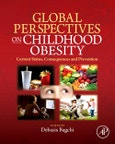- This book will cover the multi-faceted factors contributing to the rapidly growing childhood obesity epidemic
- The underlying causes and current status of rapidly growing obesity epidemic in children in the global scenario will be discussed
- The strategies for childhood obesity prevention and treatment such as physical activity and exercise, personalized nutrition plans and school and community involvement will be presented
Table of Contents
Section I: Epidemiology and Prevalence; Children Obesity: From a Pediatriacian's Viewpoint; Salient Features on Children Obesity from the Viewpoint of Nutritionists; Developmental Trajectories of Weight Status in Childhood and Adolescence; The Measurement and Epidemiology of Childhood Obesity; Good Enough Parenting, Self Regulation and the Management of Weight-Related Problems; Nursing Perspective on Childhood Obesity; Contemporary Racial/Ethnic and Socioeconomic Patterns in US Childhood Obesity; Prediabetes among obese youth; Prediabetes and Type 2 Diabetes: An Emerging Epidemic Among Obese Youth; Prevalence of the Metabolic Syndrome in US Youth; Section II: Pathophysiology; Emerging Pathways to Child Obesity Starts from the Mother's Womb: A Prospective View; The Social, Cultural and Familial Contexts Contributing to Childhood Obesity; Cardiovascular Risk Clustering in Obese Children; A Link between Maternal and Childhood Obesity; Is Prenatal Exposure to Maternal Obesity Linked to Child Mental Health?; Sleep and Obesity in Children and Adolescents; Cellular remodelling during the growth of the adipose tissue; Children Obesity, Glucose Tolerance, Ghrelin and Prader Willi Syndrome; Insulin Resistance and Glucose Metabolism in Childhood Obesity; Insulin Resistance in Pediatric Obesity Physiological Effects and Possible Diet Treatment; Role of Fatty Liver Disease in Childhood Obesity; Section III: Psychological and Behavioral Factors; An Overview of Psychological Symptoms in Obese Children; Childhood obesity: Depression, anxiety and recommended therapeutic strategies; The Emotional Impact of Obesity on Children; Psychiatric Illness, Psychotropic Medication and Childhood Obesity; Section IV: Consequences; Childhood Obesity: Public Health Impact and Policy Responses; Childhood Obesity and Juvenile Diabetes; Bone Health in Obesity and the Cross Talk between Fat and Bone;Section V: Prevention and Treatment; A Community-Level Perspective for Childhood Obesity Prevention; School-Based Physical Activity and Nutrition Curriculum in the Prevention of Childhood Obesity; School-Based Obesity Prevention Interventions Show Promising Improvements in the Health and Academic Achievements among Ethnically-Diverse Young Children; School and Community Based Physical Education and Healthy Active Living Programs: Holistic Practices in Hong Kong. Singapore and the USA; Schools as *Laboratories* for Obesity Prevention: Proven Effective Models; Fitness and Fatness in Childhood Obesity: Implications of Physical Activity; Pharmacotherapy in Childhood Obesity;.Beverage Interventions to Prevent Child Obesity; Psychotherapy as an Intervention for Child Obesity; Childhood obesity: Psychological correlates and recommended therapeutic strategies; Dietary Supplements in the Prevention and Treatment of Childhood Obesity; The Role of Arginine for Treating Obese Youth; Prevention of Childhood Obesity by Natural Products; Section VI: Commentary and Recommendations; The Role of United States' Law to Prevent and Control Childhood Obesity; Childhood Obesity as an Amplifier of Societal Inequality in the United States; Child Obesity, Food Choice and Market Influence; The Role of Media in Childhood Obesity; Evaluation and Management of Childhood Obesity in Primary Care Settings; The Future Directions of Children Obesity and Clinical Management








